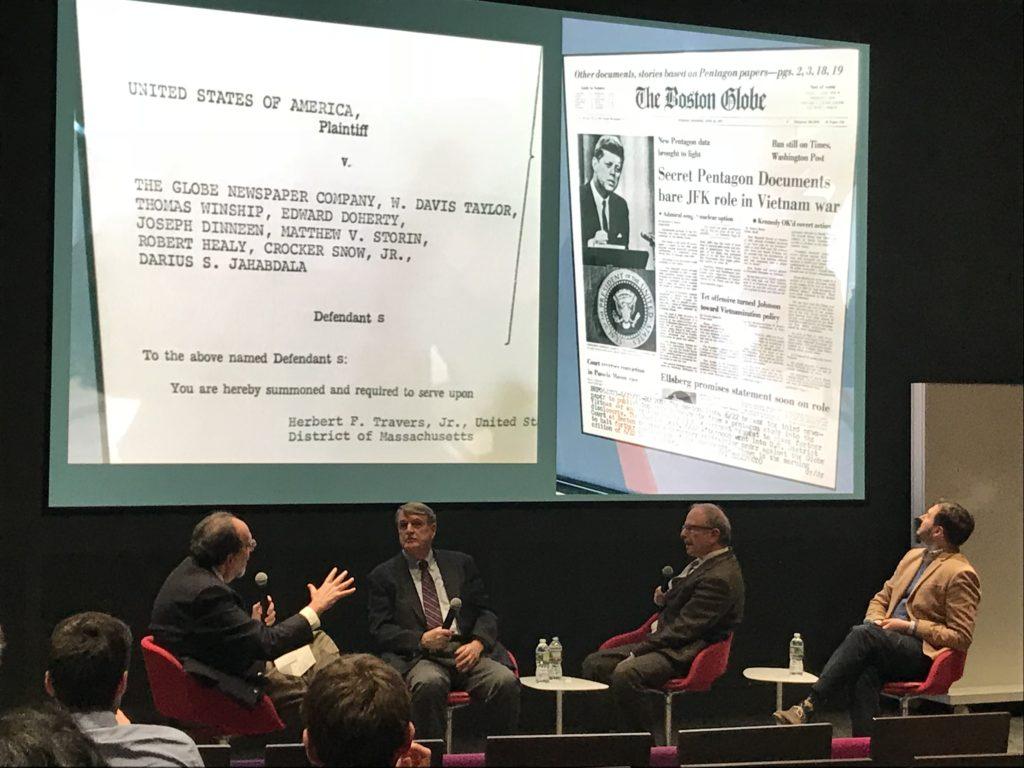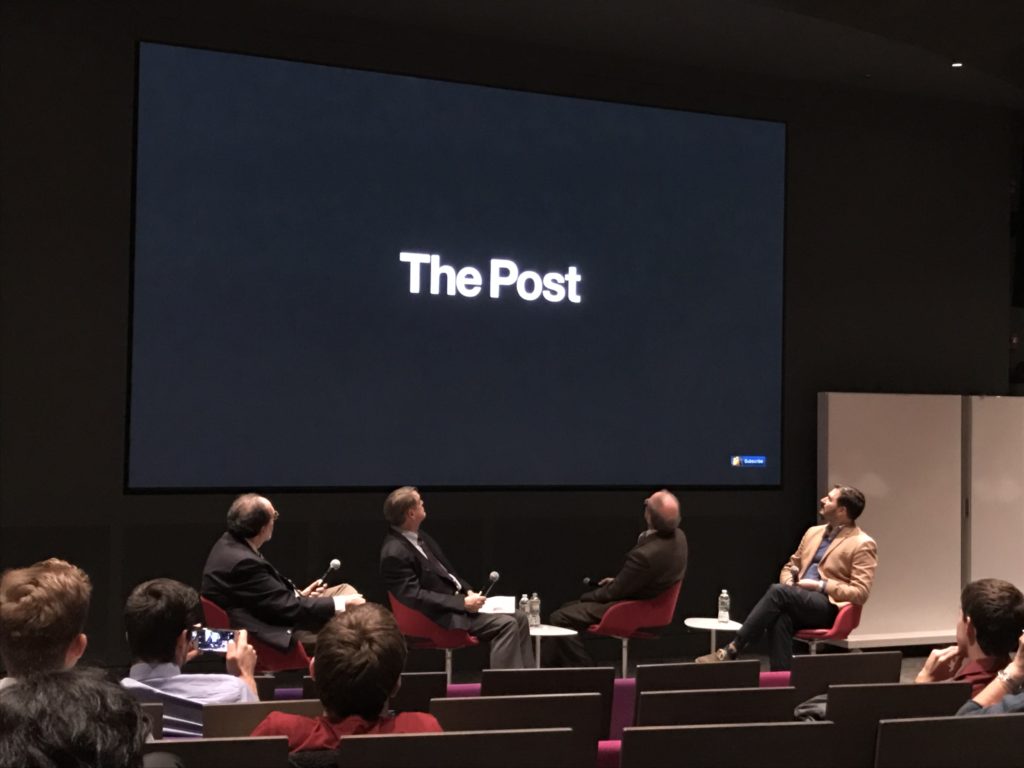New film looks at Pentagon Papers
November 29, 2017
Some may look at “The Post” and ask why a movie about the Pentagon Papers focuses on The Washington Post when the story began with The New York Times. A panel of former Post and Boston Globe editors spoke to this and dove into the monumental 1971 controversy at Northeastern University Tuesday.
Former Post Executive Editor Leonard Downie Jr., who was hired as a technical consultant on the set of the Steven Spielberg movie, said “The Post” is more about the relationship between Post publisher Katharine Graham, played by Meryl Streep, and editor Ben Bradlee, played by Tom Hanks, as they decide what to do with the papers.
Downie said some at The Times were upset the movie focused on The Post because of their rivalry.
“The question is, do you want a movie about Ben Bradlee and Katharine Graham or about Abe Rosenthal and Punch Sulzberger?” he asked to chuckles from the crowd.
“I think seeing Katharine Graham, seeing Meryl Streep playing Katharine Graham, is a very different image of women journalists. And so I think for our women students, they’re going to take a kind of pride beyond the journalism part of it that here’s a powerful woman making important decisions and really standing for the best the country could hope for.” —Jonathan Kaufman, Northeastern School of Journalism director
The panel consisted of Downie, former Boston Globe Editor Matt Storin and Northeastern professor of law Woody Hartzog and was facilitated by Northeastern School of Journalism Director Jonathan Kaufman, explored the roles of The Post and The Globe in publishing the Pentagon Papers as the legal battles hashed out in the courts.
“I think it reminds us how important journalism is,” Kaufman said after the talk. “I mean, this was taking on a president, taking on a government, taking on a war and the thought that went into it.”
The Pentagon Papers — confidential documents which detailed decades of information about the Vietnam War that varied widely from what government officials told the public — first fell into the hands of The New York Times in 1971 through Daniel Ellsberg, a military analyst who turned against the war. Three days into publication of stories about the documents, a federal district court issued a restraining order to temporarily prevent The Times from publishing about the Pentagon Papers. The Post continued the job.
Upon receiving the Papers, editor Bradlee took a team of editors and reporters to his home to work on the story, where he met with publisher Graham, lawyers and other Post stakeholders to argue about whether or not to publish any of the papers’ contents. Downie said lawyers said they should not publish as The Times had already been restrained, and members of the board worried it would bankrupt the paper.
“Graham had only been eight years in charge of The Post after the death of her husband, and as a woman I think that she already wasn’t trusted by members of the board just in running the newspaper,” Downie said of the internal controversy surrounding the publication of the papers.
Three days after The Post began publication of the Pentagon Papers, the courts enjoined them along with The Times.
At The Globe, Storin had only been the city editor for a week before the publication was pulled into the Pentagon Papers controversy, but he had just returned from a reporting trip in Vietnam and had significant foreign reporting experience relative to the rest of the Globe staff. He became a part of the reporting effort.

The conversation at The Globe on whether to publish the papers took only between five and 10 minutes, which Storin said was primarily because of widespread faith in then-Editor Tom Winship.
“Tom Winship was God in that building,” he said. “Even the publisher kind of genuflected in front of Tom Winship, and anyone who knew Tom Winship would know that there was no way that we were not going to publish those papers.”
Several staffers on The Globe were subpoenaed. Storin showed members of the audience a picture of the subpoena, which listed his name and several others.
“It’s been framed on my wall for 30 years,” he says. “It’s not every day you have the United States of America versus you.”
Downie talked about what it was like to work as a technical consultant for “The Post” and to speak directly with character actors, screenwriter Josh Singer and Spielberg. The first time Downie met Spielberg was his first day inspecting the sets, when Spielberg told him “The Post” was a labor of love he wanted to finish before the end of the year.
“He made that movie in about one-third of the time it normally takes to make a movie, and they’re all working very hard to do it,” Downie said.
Downie was also impressed by the realistic sets, including the newsroom and especially the set of Graham’s house.
“When I walked onto that set I almost had tears in my eyes because I was so fond of her,” Downie said. “Somehow, they managed to do everything exactly the same … I kept looking around the corner, like ‘Is she still here?’”
“The Post” is based on a screenplay that young screenwriter and playwright Liz Hannah wrote after reading Graham’s autobiography and reworked alongside Singer.
“[Hannah] was so taken by the arc of [Graham’s] life where she inherited a newspaper that she was not expected to run, started running that newspaper and then had to make this tremendous decision about the Pentagon Papers, and then in the case of Watergate, and continued to create a great newspaper,” Downie said.
Kaufman said the movie’s focus on Graham will create a female hero in the movie, which he said is especially important now, when the question of how women are treated in the workplace has become such a big conversation.
“I think seeing Katharine Graham, seeing Meryl Streep playing Katharine Graham, is a very different image of women journalists,” Kaufman said. “And so I think for our women students, they’re going to take a kind of pride beyond the journalism part of it that here’s a powerful woman making important decisions and really standing for the best the country could hope for.”







